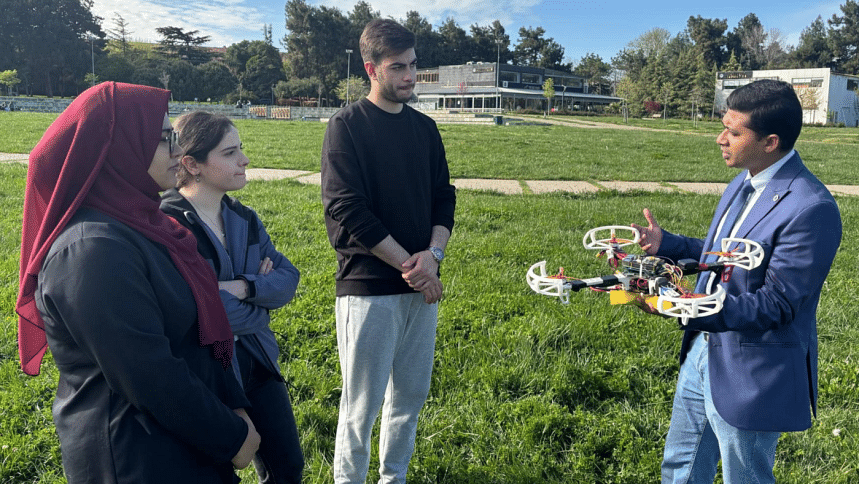A. F. M. Shahen Shah, a Bangladeshi researcher based in Turkey, has developed drone-based technology that could significantly improve emergency communication during natural disasters. Photos: Courtesy
“>
A. F. M. Shahen Shah, a Bangladeshi researcher based in Turkey, has developed drone-based technology that could significantly improve emergency communication during natural disasters. Photos: Courtesy
A. F. M. Shahen Shah, a Bangladeshi researcher based in Turkey, has developed drone-based technology that could significantly improve emergency communication during natural disasters. His work, which has gained notable coverage in Turkish media, addresses the critical problem of the collapse of communication networks following disasters such as earthquakes and floods.
Currently serving as an Associate Professor at the Department of Electronics and Communication Engineering, Yildiz Technical University, Turkey, Shah is leading a project aimed at creating a resilient mobile communication network. He and a team of researchers have designed a drone-based system to keep networks operational when traditional infrastructure fails.
“Communication networks can be severely damaged in natural events such as earthquakes and floods. However, communication is vital for rapid and effective aid interventions after a disaster,” Shah explained in a conversation with The Daily Star. “The system I am working on aims to provide an emergency communication system that will assist rescue operations in such situations and save many people’s lives.”
“A few drones are connected together and create a network that works like a base station. At the point where the base station cannot perform its function, UAVs (Unmanned Aerial Vehicles) will make it possible for communication to continue,” he further explained.
This system would allow people to reach emergency services and stay connected, much like a generator provides backup electricity during a power outage. His team also plans on optimising the performance of the system with AI (artificial intelligence), intending to make it fully autonomous.
The project, published in the ‘Drones’ journal in January 2023, has received funding from the Scientific and Technological Research Council of Turkey (TÜBİTAK) and the Scientific Research Projects Coordination of Yildiz Technical University. “In my journal publication, I presented simulation results. We conducted simulations and real-world tests in the lab after the project started. We also considered different environments,” Shah shared.
“We currently use six UAVs in the lab, which are made by us,” Shah added, “I have been working on this since 2022. The project started in August 2023 and is for three years. So, we have time until August 2026, but it will be ready for real-world use by the end of this year.”
The drone-based emergency network stands out for its immediate humanitarian application. In regions like Bangladesh and Turkey, where natural disasters frequently disrupt basic infrastructure, such a system could potentially save countless lives by enabling faster, better-coordinated emergency responses.



 For all latest news, follow The Daily Star’s Google News channel.
For all latest news, follow The Daily Star’s Google News channel. 


